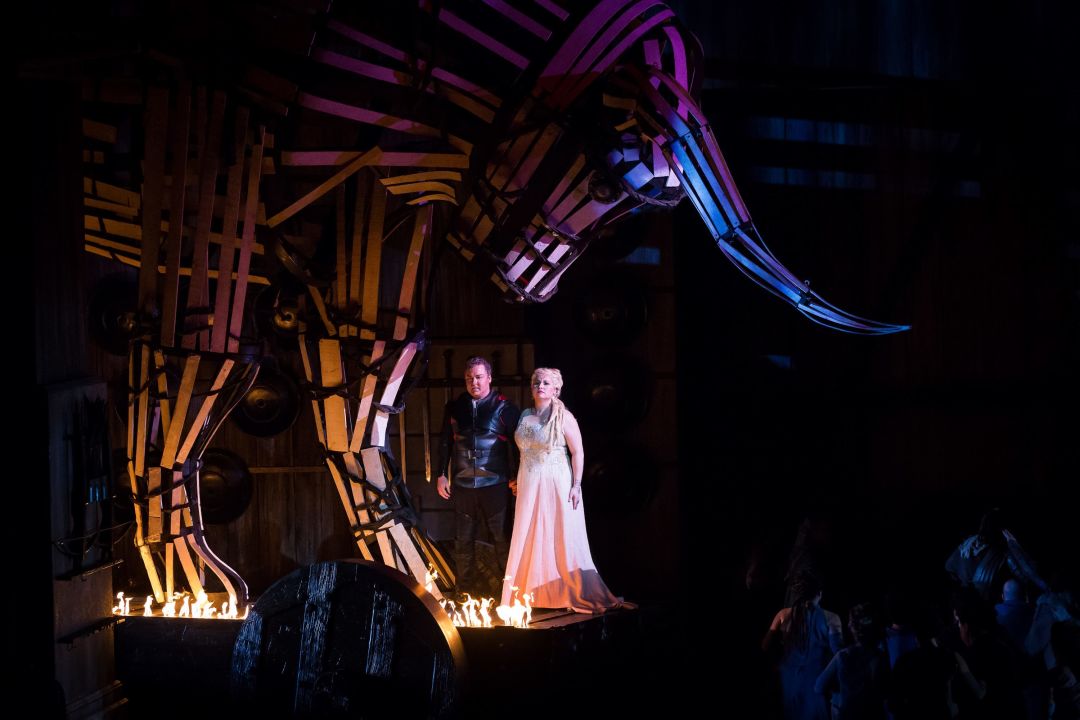Review: HGO's Norma Tells A Story of Female Empowerment

Chad Shelton as Pollione and Liudmyla Monastyrska as Norma in Houston Grand Opera's co-production of Norma.
Image: Lynn Lane
Revenge, prophecy, and sacrifice are all words that come quickly to mind when anyone mentions Bellini’s 1831 Norma. What Houston Grand Opera’s latest performance of the bel canto favorite emphasizes instead is modern female empowerment.
A co-production of San Francisco Opera, Lyric Opera of Chicago, Canadian Opera Company, and Gran Teatre del Liceu directed by Kevin Newbury, this Norma uses Pollione’s betrayal to launch two powerhouse women to sublime heights: soprano Liudmyla Monastyrska as Norma and mezzo-soprano Jamie Barton as Adalgisa. Pacing herself in the famously demanding role, Monastyrska saved her voice for the second act, and while the choice made for an underwhelming first-act performance of the beloved “Casta Diva” aria, it all paid off when she set to the second-act duets with Barton and culminated in an absolutely stunning delivery of the line “I am the one!” It was pure heartbreak, utterly gorgeous.
Barton, whose voice transformed Wagner’s frumpy Fricka into utter sophistication for HGO’s Ring cycle, showed her breadth as an artist with Bellini’s ornamented bel canto, handling each turn and leap with silky ease. When Barton and Monastyrska embraced, singing, “For the rest of my life I shall always stay with you / We shall fight outrageous destiny as long as in our breasts our loving hearts shall beat,” their voices intertwined in a golden braid of technical agility and splendor.
As Pollione, the Roman who starts all the trouble, tenor Chad Shelton made a strong showing, navigating the bel canto style adeptly with a rich timbre but never outshining the two women he almost comes between. Never has the line, “Too late I have known you sublime woman” sounded truer and sadder. As Oroveso, Norma’s father and high priest, bass Peixin Chen gave a perfunctory performance emotionally, but his voice spoke volumes of prophetic demise, burning anger, and carnage.
A large part of the strength of this production is owed to set designer David Korins and lighting designer Duane Schuler. Towering temple doors flanked by bulls and equipped with rows of swords, ropes, and battle axes open to reveal a lonely forest that glows coldly under a shifting ice gray to blue and purple light that burns hot pink and red when Norma cries for revenge. It’s opera drama done right—fantastically imposing without reaching hysteria.
At the podium, Patrick Summers, the ever-adept conductor and HGO’s artistic and music director, faced perhaps the biggest challenge all season of holding the center with Bellini’s unforgivingly ornamented score. Not every cut-off and orchestral complement to a vocal flourish was perfect, leading to slower tempos to accommodate the fall out, but Summers remains an indelible leader focused on achieving grandeur. My hat is off to chorus master Richard Bado, who has outdone himself with HGO’s chorus here. When Norma, arms cast out above her adoring multitude, called them “to rage, to battle, to their death!” the chorus beneath her delivered an electric “Blood! Blood! The Gallic axes are bathed in the blood of the Roman.”
At the end of this Norma, you’ll find more than a man facing the woman he betrayed in her final moments, but rather the undying bond between two women so spectacular that the man hardly matters.
Thru May 11. Tickets from $25. Resilience Theater at George R. Brown Convention Center, 1001 Avenida de las Americas. 713-228-6737. More info and tickets at houstongrandopera.org.




